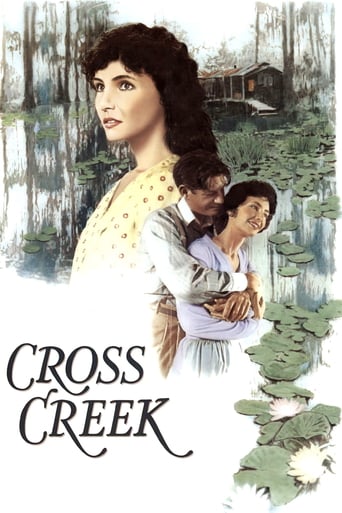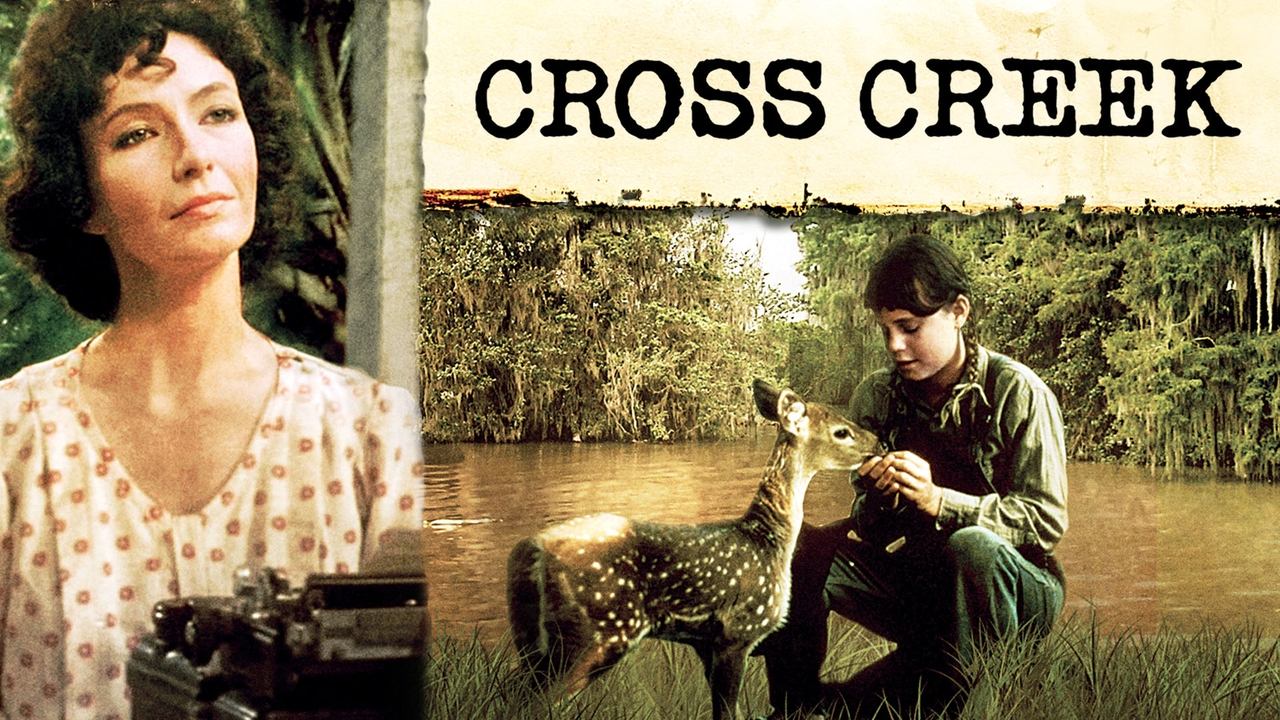aj989
So-called "Woman's Films," containing narratives built around the dilemmas (romantic or otherwise) faced by the film's central female character, were popular attractions at movie theaters throughout the 1930s and 1940s only to die out as tastes changed. Audiences were drawn to these films, which usually featured strong female characters, romance, and stories of female perseverance. "Cross Creek" functions more or less as a "woman's film." It's the story of Marjorie Kinnan Rawlings (Mary Steenburgen), the author of the classic novel "The Yearling." Seeking inspiration after a fallow creative period, Rawlings sets out, despite the concerns and objections of others, including her current husband, to a remote part of rural, backwoods Florida, populated only by people who live off the land, not because they have to, but because it's the only way the know how to live. And they love it all the same. After an initial rough start in her new home in Cross Creek, Rawlings perseveres. At Cross Creek with the help of her maid Geechee (Alfre Woodard), neighbors (Rip Torn and Joanna Miles), a farmhand/moonshiner (Ike Eisenmann) and the pastoral beauty of her surroundings, Rawlings finds community, solace and the inspiration to write "The Yearling" after a series of repeated rejections by her publisher. Marjorie's romantic life is a lesser concern for the film. She has a suitor (Peter Coyote), who she rejects at one point, before agreeing to his proposal, but the film is more about Marjorie's love for her surroundings. Martin Ritt captures the damp, sweltering beauty of this part of Florida wonderfully. The production design and costumes are additionally well done.Refreshingly, the film largely refuses to condescend to those who call Cross Creek home. When they could've easily been portrayed as a bunch of hicks for cheap laughs or simply out of derision, Cross Creek's inhabitants are seen as normal people living in a unique environment. Only Geechee, the maid played with wonderful exuberance by Alfre Woodard, is rather cliché ridden. (It should be said that the film really isn't interested in Geechee at all – she doesn't even possess a real name) The character is a stereotypically loyal, deferential servant used occasionally to lighten the film's usually somber mood. And her boyfriend, LeRoy, is shown as simply shiftless. A few other faults remain with the film. "Cross Creek," in general, has all the ingredients of a good "Woman's Picture" (escapism, female triumph and perseverance, a little romance), except for, perhaps, the most important part - a strong female lead. Steenburgen, often appearing as she's about to wilt, just isn't strong or compelling enough. She's awfully milquetoast and dainty in the lead role, which makes her character's eventual triumphant adaptation to her often harsh and unwelcoming surroundings a little less believable. Coming off her massive success in "Melvin & Howard," "Cross Creek" was the first time she had the opportunity to headline a major motion picture and it was also basically the last time as well. The film (decidedly character driven) also drags at times and one occasionally may wonder, over the course of the film's two hour running time, about the film's larger meaning and the reasons for it being made. Is it about the importance of community; the inspiring powers of nature; a woman's quest for independence and meaning; or is it simply the tale of how "The Yearling" came to be? The film doesn't quite seem to know either.
Ruby Liang (ruby_fff)
"Cross Creek" the 1983 Martin Ritt film tells the story of feisty author Marjorie Kinnan Rawlings, how she came to be attached to Cross Creek in Alachua County, Florida. The script by Dalene Young, based on Rawlings' own memoirs, along with engaging music by Leonard Rosenman, do at times seem like a Hallmark TV movie, yet a Martin Ritt film is never without poignancy, contrasting elements of conflicts and choice decisions. Thought-provoking drama, emotional highs and lows, not forgetting dashes of humor (be it in brief exchanges between key characters, or bemused scenes that'd elicit a smile from you) and jolting dark moments that's part of living - it's a Ritt movie, alright.What a talented cast assembled: the Alfre Woodard's Geechie scenes opposite Miss Rawlings, played by Mary Steenburgen, gave us the exceptional camaraderie rare at such time and place of the '40s; the confrontational yet congenial Rip Torn's Marsh Turner encounters could be heart-wrenching at times and whimsical at another; the tender and vulnerable segments with Dana Hill's portrayal of 14-year old Ellie Turner facing her Pa (Rip Torn) over the keeping of the fawn (the yearling) are memorable; the simultaneously comfortable and contradictory feelings when Marjorie and Peter Coyote's Norton Baskin meet at their varying circumstantial moments - what a treat to watch their facial expressions and sensitive performances. The nuance acting did not stop with the four key roles, as the supporting cast that included Paul (Ike Eisenmann), Mrs. Turner (Joanna Miles), Tim's wife (Toni Hudson - the scene of Marjorie visiting her and the new baby did momentarily remind me of the 1979 w-d Victor Nunez' small gem of the film "Gal Young 'Un"), the Turner children, however small the role may be, had made "Cross Creek" whole.The opening credits included a frame thanking Mr. Norton Baskin (Rawling's second husband who survived Marjorie by 44 years till 1997) for his assistance in the preparation and production of the film. In the 17-minute featurette "Cross Creek: A Look Back with Mary Steenburgen" on the DVD (distributed 2002 by Anchor Bay Entertainment and Studio Canal), when asked if the film was true in depicting Rawlings at the 1983 Cannes Film Festival, Baskin responded favorably, "it's as close as you can get." We see the various moods and aspects of Marjorie, be it tempestuous, headstrong, or sheer charming, especially when the subject is food and cooking.And it is absolutely true, "Cross Creek" the film wouldn't have been (existed) if not for cinematographer John A. Alonzo's supremely enchanting camera-work. The bayou marsh vegetation scenes, the trees and reflections in the waters, the sky and clouds mirrored in the river surface, the natural nature scenes that are very much Cross Creek's own in the rain, wind and sun - we are blessed by Alonzo's cinematic artistry and craftsmanship. Excerpt quoting of Marjorie Kinnan Rawlings': "Who owns Cross Creek? The earth may be borrowed, not bought; may be used, not owned; it gives itself in response to love and tenderness, offers its seasonal flowering and fruiting." This is a guarantee of worthwhile viewing, indeed. As Mary Steenburgen pointed out in her featurette on the DVD, "Cross Creek" the film included a 'bonus' 20-second cameo appearance of Norton Baskin in person at the beginning (about 7 minutes into the film) - catch it if you can.
ravmeltt
This movie was apparently made in 1983, and I can't believe this is the first time I've seen it. Many have commented that it is a pretty laid back movie, and I agree. But laid back is not necessarily a bad thing. I for one did not realize that Florida had such lavish greenery and beautiful creeks. The beauty of the landscape was very well shown, and I thoroughly enjoyed looking at it. As someone asked, would we want to change these people, to make the movie more exciting? No we wouldn't, because that is the era that the movie is depicted in, and laid back is what that time was. If one wanted to see an action packed movie, then one should have looked at something else, but this movie to me was truly beautiful, and it made me go further into looking at the biographical life of Ms Kinnan Rawlings. In this age of internet and people being able to freely write their criticisms, it is so easy for anyone to become a critic, and I think that some people have been very critical of Ms Steenburger, or Mr Ritt (I think he is the director) and the film itself. But how many of us if given the opportunity, could do as good or better. It is time to sit back and enjoy some of these laid-back movies, and remember a time that is long past, a time that we daresay we may never ever see again. Because in this age of killing, and swearing, and condos, and high rise buildings, it is wonderful to sit back and relax in a movie such as Cross Creek, and embrace a time long past and almost forgotten.PS. I did not know Mary Steenburgen was previously married to Malcolm McDowell. Also, Alfre Woodard was so great in this movie that I found myself wanting to know more about the character she depicted, Geechee, but obviously nothing much was said about Geechee, even in Ms Rawlings' biography or autobiography of her. If anyone has any more info on that, would be great to hear it.
lastliberal
I was inspired to revisit this classic after seeing Mary Steenburgen in Time After Time with Malcolm McDowell. McDowell had a small part in this film also as Rawlings' publisher.Eighty years ago, Marjorie Kinnan Rawlings gave up everything to move to Florida and write. She went as far away from everything as you could go. In the land of orange groves, cypress trees, and wildlife abundant, she found the inspiration she needed. This is her story.It is peppered with colorful characters that lived in the backwoods of Florida, a place that hardly exists anymore with all the development. It featured outstanding performances by Rip Torn as her neighbor, Peter Coyote as the one who was trying to win her heart, Dana Hill as the young girl that inspired "The Yearling," and Alfre Woodard in one of her first roles.Torn and Woodard got Oscar nominations for their performances.One of the most impressive features of the film, other than showing the beauty of Florida that is long gone, is the respect shown for the land by Rawlings. Any Native American would be proud of her respect for the land.It is an inspirational family film that is worth revisiting over and over.


 AD
AD



